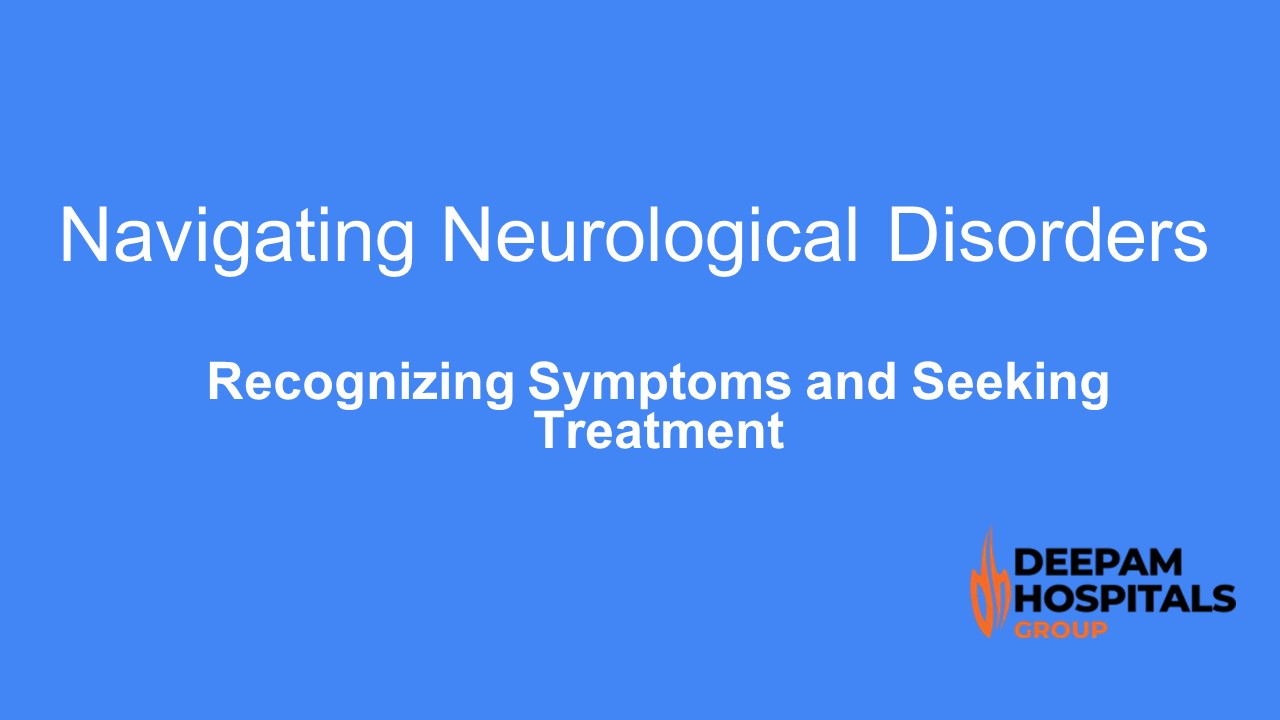Navigating Neurological Disorders :- Recognizing Symptoms and Seeking Treatment - PowerPoint PPT Presentation
Title:
Navigating Neurological Disorders :- Recognizing Symptoms and Seeking Treatment
Description:
There are many different neurological conditions that can affect the human brain function Below we list out some of its conditions & symptoms Migraines Multiple Sclerosis Parkinson's Disease Alzheimer's Disease Epilepsy Stroke If you or a loved one is experiencing any of these symptoms, it is important to speak with our Deepam Hospital neurologist doctors Book Neurologist Appointments At Call & WhatsApp: (+91) 8270666699 For More Information Visit Our Website At www.deepamhospitals.com – PowerPoint PPT presentation
Number of Views:2
Title: Navigating Neurological Disorders :- Recognizing Symptoms and Seeking Treatment
1
Navigating Neurological Disorders
- Recognizing Symptoms and Seeking Treatment
2
Neurological Conditions And Symptoms
- There are many different neurological conditions
that can affect the human brain function - Below we list out some of its conditions
symptomsMigraines - Multiple Sclerosis
- Parkinson's Disease
- Alzheimer's Disease
- Epilepsy
- Stroke
3
Migraines
- Migraines are a type of headache that can be
quite debilitating. - They are often characterized by severe pain,
sensitivity to light and sound, and nausea. - Some people may also experience visual
disturbances or other sensory symptoms before the
onset of the headache. - Migraines can be triggered by a variety of
factors, including stress, certain foods, and
hormonal changes.
4
Multiple Sclerosis
- Multiple sclerosis (MS) is a chronic autoimmune
disorder that affects the central nervous system.
- Symptoms can vary widely depending on which parts
of the brain and spinal cord are affected - But can include muscle weakness or stiffness,
fatigue, vision problems, and difficulty with
coordination or balance.
5
Parkinson's Disease
- Parkinson's disease is a progressive neurological
disorder that affects movement. - It is characterized by tremors, stiffness, and
slowness of movement, and can also cause
difficulty with balance and coordination. - Parkinson's disease is caused by the degeneration
of dopamine-producing neurons in the brain.
6
Alzheimer's Disease
- Alzheimer's disease is a progressive neurological
disorder that affects memory and cognition. - It is characterized by the accumulation of
protein plaques and tangles in the brain, which
interfere with normal brain function. - Symptoms can include memory loss, difficulty with
language and communication, and changes in mood
and behavior.
7
Epilepsy
- Epilepsy is a neurological disorder characterized
by seizures, which can take many different forms.
- Seizures occur when there is abnormal electrical
activity in the brain, and can be triggered by a
variety of factors, including stress, sleep
deprivation, and flashing lights.
8
Stroke
- A stroke occurs when blood flow to the brain is
interrupted, either due to a clot or a ruptured
blood vessel. - Symptoms can include sudden weakness or numbness
on one side of the body, difficulty with speech
or understanding language, and vision problems. - Quick intervention is essential in order to
minimize the long-term damage caused by a stroke
9
Deepam Hospital - Best Neurologist Doctors
- If you or a loved one is experiencing any of
these symptoms, it is important to speak with our
Deepam Hospital neurologist doctors
10
- Book Neurologist Appointments At
- Call WhatsApp (91) 8270666699
- For More Information Visit Our Website At
- www.deepamhospitals.com































